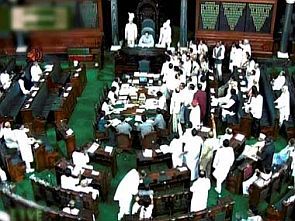 Political parties are worried that the Chief Information Commission's order will compel them to disclose the source of their funding and raise queries about other internal decisions, says Anita Katyal
Political parties are worried that the Chief Information Commission's order will compel them to disclose the source of their funding and raise queries about other internal decisions, says Anita Katyal
Despite the incessant disruptions and bitter clashes between political parties witnessed in the ongoing monsoon session of Parliament, lawmakers from across the political spectrum will display rare unanimity in the coming days to pass two bills aimed at protecting their interests.
The Opposition and the Treasury are on the same page about the bill, keeping political parties out of the ambit of the Right to Information Act, and a bill nullifying a recent Supreme Court order disqualifying a convicted Member of Parliament or Member of Legislative Assembly and disallowing those in jail from contesting elections.
The United Progressive Alliance government is hoping to use this opportunity to push their key legislations like the ‘game changer’ Food Security Bill, the Land Acquisition Bill, a bill replacing the ordinance empowering Securities and Exchange Board of India to take action against illegal deposit schemes and pension and insurance bills.
The government’s legislative agenda has been effectively stalled in Lok Sabha which has failed to transact any business so far because of continuous protests.
The Congress-led UPA government believes it will be on a strong wicket vis-a-vis the opposition if it cooperates in passing the two legislations, which are of interest to them, but stall the Food Security Bill.
The Congress can then launch a blistering campaign against the Bharatiya Janata Party and other parties for blocking ‘pro-poor’ legislation.
While the Congress game-plan is to push the principal opposition party into a corner on this issue, the BJP has devised a new way of stalling the Centre’s key legislations.
Instead of opposing these bills, which would prove to be politically counter-productive, the BJP is indirectly urging Andhra Members of Parliament to keep up their protests in the House, so that no business can be conducted.
The government has now decided to debate the Food Security Bill on Monday.
The Lok Sabha may take up the Bill amending the RTI Act on Saturday since it was decided that the Lower House would meet on the next two Saturdays to clear the legislative backlog.
The government moved in quickly to finalise these amendments after the Central Information Commission's June order -- stating that the Congress and five other political parties could be scrutinised under the RTI Act as they received public funds in various forms.
The amendment proposed by the government states that political parties are not "public authorities" and, therefore, cannot be questioned under the RTI Act.
The parties are worried that the Chief Information Commission's order will compel them to disclose the source of their funding and raise queries about other internal decisions.
The Supreme Court's order disqualifying convicted lawmakers has brought together all political parties, which are all in agreement with the government about bringing in necessary amendments to the Representation of People Act, to nullify the apex court’s verdict.
After extensive discussions with other political parties, the Union Cabinet on Thursday cleared the proposal allowing candidates in jail from contesting elections and allowing convicted MPs and MLAs to retain their seats, while their appeal challenging the order is pending in court.
Aware that this move will attract flak from the electorate, political parties have made a concession -- convicted MPs and MLAs will not be allowed to vote or draw their salaries during the pendency of their cases.
This bill has been listed for discussion on Monday.
UPA sources said the government had to move fast on these two bills because of the year-end assembly elections in Madhya Pradesh, Chhattisgarh, Rajasthan, Delhi and Mizoram.
It was pointed out that if these changes are not approved, it could lead to chaos in these polls, as political rivals would be encouraged to file false police cases against each other or embroil their opponents in unnecessary RTI queries.
According to the amendments to the RPA cleared by the Cabinet on Thursday, an MP or MLA will not be liable for disqualification after conviction if he or she files an appeal within 90 days from the conviction date and this conviction is stayed by the court.
Though the convicted MP or MLA will be entitled to participate in the proceedings of Parliament or assembly, he or she will not be allowed to vote or draw a salary.
The second amendment states that a jailed person does not cease to be a voter and as the name of the jailed person remains on the electoral rolls, he or she continues to be an elector and can contest an election.
The two amendments will be brought in the form of two separate bills.











 © 2025
© 2025